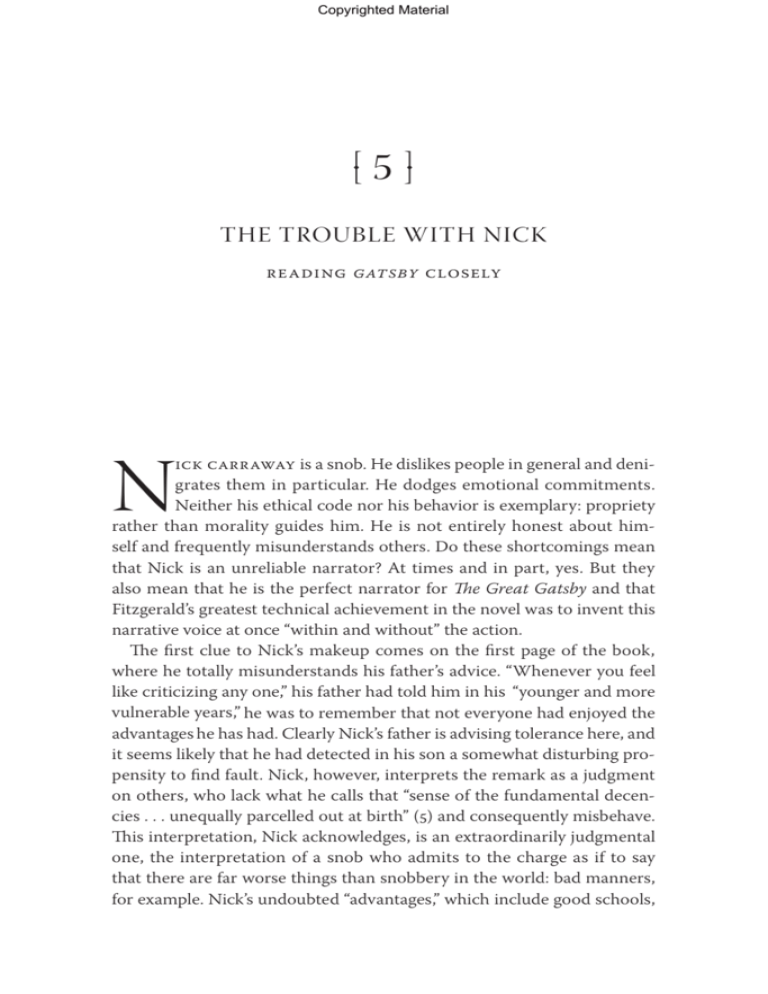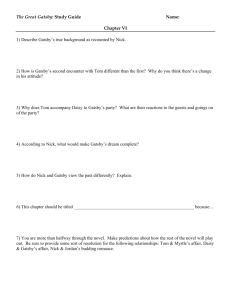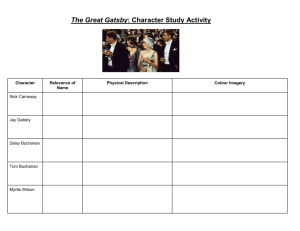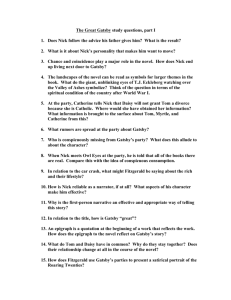THE TROUBLE WITH NICk - St Killian's English Department
advertisement

Copyrighted Material 9 5 0 The Trouble with Nick Reading Gatsby Closely N ick Carraway is a snob. He dislikes people in general and denigrates them in particular. He dodges emotional commitments. Neither his ethical code nor his behavior is exemplary: propriety rather than morality guides him. He is not entirely honest about himself and frequently misunderstands others. Do these shortcomings mean that Nick is an unreliable narrator? At times and in part, yes. But they also mean that he is the perfect narrator for The Great Gatsby and that Fitzgerald’s greatest technical achievement in the novel was to invent this narrative voice at once “within and without” the action. The first clue to Nick’s makeup comes on the first page of the book, where he totally misunderstands his father’s advice. “Whenever you feel like criticizing any one,” his father had told him in his “younger and more vulnerable years,” he was to remember that not everyone had enjoyed the advantages he has had. Clearly Nick’s father is advising tolerance here, and it seems likely that he had detected in his son a somewhat disturbing propensity to find fault. Nick, however, interprets the remark as a judgment on others, who lack what he calls that “sense of the fundamental decencies . . . unequally parcelled out at birth” (5) and consequently misbehave. This interpretation, Nick acknowledges, is an extraordinarily judgmental one, the interpretation of a snob who admits to the charge as if to say that there are far worse things than snobbery in the world: bad manners, for example. Nick’s undoubted “advantages,” which include good schools, Copyrighted Material the trouble with nick 9990 social position, family background, and even an exclusive senior society at Yale, may eventuate in an awareness of the “fundamental decencies” if one construes the phrase narrowly as conforming to conventional standards of propriety, but they hardly guarantee any moral acumen. So it is with Nick Carraway. Above all he disapproves of those who do not know how to act. That is why it takes him so long to ascertain that Jay Gatsby, a walking compendium of social gaucheries, is nonetheless worth any number of Buchanans. Nick’s misunderstanding of his father should also put us on guard against his claim that he’s “inclined to reserve all judgments,” especially when in the next breath he speaks of the “veteran bores” and “wild, unknown men” who have made him privy to “intimate revelations . . . usually plagiaristic and marred by obvious suppressions.” Had they suppressed less, Nick might have been more interested. “Reserving judgments is a matter of infinite hope,” he observes, and he is not the character in the novel possessed by infinite hope. He listens to confessions since he is “a little afraid of missing something” (5) otherwise: a vicarious sense of having drunk his cup to the lees. But he does not suspend judgment. Nick judges, and condemns, practically everyone he meets in the course of the novel. Collectively he speaks of closing off his interest in the “abortive sorrows and short-winded elations of men” (6). Introducing individual specimens of this sorry genus, he delineates more specific physical deficiencies. Tom Buchanan has straw hair, a hard mouth, a supercilious manner, and a cruel body with which he pushes people around. There had been men at Yale who hated his guts, and if Nick is not among them, it’s not because he can’t see why. His wife Daisy, Nick’s second cousin once removed, speaks in a thrilling voice, but she murmurs so low that people must bend toward her to hear. Her insincere remark about having “been everywhere and seen everything and done everything” (17) strikes Nick as “a trick of some sort” to exact an emotional commitment from him. With the lower orders Nick is still less charitable. Myrtle Wilson, smoldering with vitality, carries her “excess flesh sensuously” (23) and comically takes on airs in the West 158th St. apartment Tom has secured for their rendezvous. Meyer Wolfshiem is presented as a small Jew with tiny eyes, a flat nose in whose nostrils “fine growths of hair” luxuriate, and cuff buttons made of “finest specimens of human molars” (55, 57). Sentence is passed rapidly on minor characters. Myrtle’s sister Catherine—“a slender, worldly girl of thirty” with a sticky bob of red hair, rakishly painted eyebrows, and eternally jangling bracelets—is disposed of in a paragraph (26). Copyrighted Material 91000 love, money, and cl ass In the catalog of those who attend Gatsby’s parties, people are labeled and found wanting by name alone. “The Dancies came, too, and S. B. Whitebait, who was well over sixty, and Maurice A. Flink, and the Hammerheads, and Beluga the tobacco importer, and Beluga’s girls”: something is fishy here (50). Nick’s basic contempt for mankind emerges in what he says and thinks as well as in descriptions of others. His particular way of telling the story has been variously characterized in the critical literature on The Great Gatsby, but surely a dominant characteristic of that voice is its irony. This sometimes leads to light-hearted bantering in conversation, as with Daisy. Is she missed in Chicago, she asks? “All the cars have the left rear wheel painted black as a mourning wreath,” he answers, “and there’s a persistent wail all night along the north shore” (11), a wittily casual remark that takes on resonance as the novel’s motif of careless driving develops. Would Nick like to hear about the butler’s nose, she inquires? “That’s why I came over to-night,” he responds (14). His unspoken thoughts, however, tend toward the more hostile levity of sarcasm. In his mind Nick constantly puts others down. After listening to Tom Buchanan maunder on about impending racial struggles and the increasing (or is it declining?) heat of the sun, Nick devastates the man he has helped to cuckold when, with his eyes finally opened to the affair between Daisy and Gatsby, Tom begins to expound on the scientific proof for his “second sight” and then stops, the “immediate contingency” having “pulled him back from the edge of the theoretical abyss” (94–95). Soon after, Nick characterizes Tom’s hypocritical defense of family solidarity as . “impassioned gibberish” (101). Buchanan deserves such scornful treatment, but what of poor Henry Gatz, who proudly shows Nick his dead son’s schedule for self-improvement, written in his copy of Hopalong Cassidy? “He was reluctant to close the book, reading each item aloud and then looking eagerly at me. I think he rather expected me to copy down the list for my own use,” Nick sniffily observes (135). Then there is the “persistent undergraduate” who brings Jordan Baker to one of Gatsby’s parties under the impression that sooner or later she will “yield him up her person” (37). When that prospect fails to develop, the undergraduate becomes engaged in “an obstetrical conversation with two chorus girls” and “implore[s]” Nick to join him (42). As Wolfshiem remarks in another sense, the undergraduate has “a wrong man” (56). Nick is not interested in making improper connections. He’s not interested in making any lasting connections at all. Nick Carraway carefully avoids emotional entanglements. He writes letters signed “Love, Nick” to a girl back home, but one reason he’s come Copyrighted Material the trouble with nick 91010 to New York is to avoid “being rumored into marriage” with her (19). Unable to stop thinking how “a faint mustache of perspiration” develops on her upper lip when she plays tennis (48), he finally severs the relationship. In the East he has “a short affair with a girl who lived in Jersey City and worked in the accounting department,” but he lets it “blow quietly away” when her brother begins “throwing mean looks” in his direction (46). Jordan, his social peer, poses a more serious threat to his bachelor status. He is attracted to her hard, jaunty body and superior chin-in-air attitude, even though he knows she will lie to avoid responsibility and cheat to win at golf. But in the end she seems too much of a piece with Tom and Daisy, so he breaks off with her, too, before returning to the Middle West. It is not surprising that Nick has reached thirty without being married or engaged: he does not reserve judgment, he reserves himself. Prufrock-like, he contemplates his future: “a decade of loneliness, a thinning list of single men to know; a thinning briefcase of enthusiasm, thinning hair” (106). In the light of this pattern, one regards with suspicion Nick’s claim that releasing himself from a “vague understanding” with the girl back home before pursuing another with Jordan makes him “one of the few honest people” he’s ever known (48). In an early draft, Fitzgerald wrote “one of the few decent people,” later altering it to “honest.” Apparently thinking that he had made Nick too unreliable as a narrator, in revision he also “added material which stressed Nick’s belief in his own honesty and deleted passages which might undercut [his] integrity,” such as offering Gatsby and Daisy the keys to his house (Parr, “Individual Responsibility,” 678). Still, where honesty is concerned, it is undeniable that Nick regards telling the truth as less important than avoiding the unseemly. A case in point is his remark that Catherine had shown “a surprising amount of character” at Myrtle’s inquest by falsely swearing that her sister “had been into no mischief whatever” (127), a lie designed to avert a public scandal. Social decorum ranks high on Nick’s scale of values, certainly higher than honesty, and it guides his attitude toward sexual morality. Adultery abounds in The Great Gatsby. It is rather the expected thing among the idle rich. As Jordan says, Daisy “ought to have something in her life” (63). Only those who contract liaisons with lovers of higher social standing (Myrtle and Gatsby), though, are punished for their sin or for their presumptuousness. What most concerns Nick about this extramarital coupling is the manner in which the affair is conducted. Daisy, he thinks, should “rush out of the house, child in arms” upon discovering Tom’s infidelity. Nor can he approve of the way Tom orchestrates the affair, taking his mistress to popular restaurants to show her off and then abandoning her to chat with Copyrighted Material 91020 love, money, and cl ass acquaintances. Tom further concocts the falsehood that Daisy is Catholic to explain to Myrtle why he cannot be divorced. As voyeur Nick is curious to see Tom’s girl; as snob he has no desire to know her. When they do meet, Myrtle proves a veritable model of social pretentiousness. In clothes, in gestures, in conversation, Nick presents her as simply ridiculous. Not until Tom breaks her nose does she merit any sympathy whatever. Nick himself appears rather ridiculous when, in his obsession with propriety, he twice insists on having actually been invited to Gatsby’s first party, unlike most of the gate crashers. Moreover, although all around him people are conducting themselves “according to the rules of behavior associated with amusement parks” (34), he repeatedly tries to meet and thank his host, as at a formal gathering. This proves difficult, and meanwhile Jordan turns up, relieving him of the danger of addressing “cordial remarks to passers-by” (35). When be finally does encounter Gatsby late in the evening, Nick is caught off guard: he’d been expecting “a florid and corpulent person in his middle years” (40). For a long time Gatsby continues to confound Nick’s expectations. Unlike almost everyone else in Nick’s world, he resists classification. It’s not merely that Nick is curious about Gatsby: everyone is curious about him. But while others merely speculate about Gatsby’s relationship with von Hindenburg or his career as a killer, Nick is exposed through two rather remarkable coincidences—moving in next door and knowing Daisy—to more intimate revelations from the figure of mystery himself. Gatsby’s first preposterous account (wealthy parents from the western city of San Francisco, war hero educated at Oxford who subsequently “lived like a young rajah in all the capitals of Europe . . . collecting jewels, chiefly rubies, hunting big game, painting a little . . . and trying to forget something very sad”) tends to confirm Nick in his view of his neighbor as pretentious arriviste, inventing a background to replace the one he lacks. Even though Gatsby produces the medal from Montenegro and the cricket photograph, Nick is not persuaded: “Then it was all true,” he proclaims in ironic overstatement. “I saw the skins of tigers flaming in his palace on the Grand Canal; I saw him opening a chest of rubies to ease, with their crimson-lighted depths, the gnawings of his broken heart” (52–53). Nick’s cynicism is further underlined in two subsequent incidents. Stopped for speeding, Gatsby flashes the policeman a white card which purchases instant immunity. “What was that?” Nick asks. “The picture of Oxford?” (54). Later, during the tour of the mansion and after the lavish display of shirts, Nick has a characteristically sardonic thought: “I was going to ask to see the rubies when the phone rang . . .” (73). Copyrighted Material the trouble with nick 91030 Under the circumstances Nick hardly expects any section of Gatsby’s fabulous story to be true, yet when Gatsby modifies his tale to explain why and for how long he’d actually gone to Oxford, Nick is willing to put all the young rajah balderdash out of mind: “I had one of those renewals of complete faith in him that I’d experienced before” (101). Part of Nick wants to believe in Gatsby, just as another part holds him up for ridicule. The snob in Nick Carraway finds Gatsby contemptible. He makes the point both on the second page of the novel (“Gatsby . . . represented everything for which I have an unaffected scorn”) and on page 120 (“I disapproved of him from beginning to end”). Significantly, this second statement immediately follows Nick’s “You’re worth the whole damn bunch put together” speech. He can simultaneously praise Gatsby, in other words, and still disapprove of the “gorgeous pink rag of a suit” he’s wearing, scorn his “old sport” affectation, disapprove of his ostentatious Hôtel de Ville and extravagant parties, scorn his shady business “gonnegtions”—above all, disapprove of his social incompetence. Gatsby obviously lacks that “sense of the fundamental decencies” that comes with the right background. He seems to think that his awful parties are socially respectable gatherings. Yet Nick facilitates Gatsby and Daisy’s affair by inviting the two of them for tea (“Don’t bring Tom,” he warns her), and he encourages their continuing relationship by “remaining watchfully in the garden” while they talk on the steps of his house for half an hour (66, 82). The question is why. Jordan asked him to arrange the tea, for one thing, and Nick dislikes Tom and knows of his unfaithfulness and brutality. But he would not have so willingly played the role of go-between had he not felt a curious kinship with the “elegant young roughneck” (40) in the mansion next door. The fact is that Nick, like Gatsby, has romantic inclinations. But while Gatsby guides his life by his dream, Nick carefully separates romance from reality. What he most admires in Gatsby is the “extraordinary gift for hope,” the “romantic readiness” he has found in no one else (6). Nick’s first glimpse of his neighbor comes after the dinner party at the Buchanans, when he returns home to catch sight of someone on the lawn next door. He is about to call out (having concluded, in his obsessive concern with etiquette, that Jordan’s mentioning Gatsby “would do for an introduction”) when the solitary figure stretches “out his arms across the water” as if to reach the green light at the end of Daisy’s dock. Far away though Nick is, he could swear that the man is trembling (20). Gatsby trembles elsewhere and so do Tom, Daisy, and Mr. Gatz. Nick does not, himself, tremble, but it is a physical reaction he can understand and identify with. It appeals to Copyrighted Material 91040 love, money, and cl ass the side of his nature that conjures up “sumptuous and romantic apartments” concealed above Wilson’s garage (!) in the valley of ashes (22), the side that imagines entering the lives of “romantic women” on Fifth Avenue, so long as “no one would ever know or disapprove.” But as that last thought suggests, Nick is too proper, too emotionally cautious, to bring his fantasies about strangers to life: who would introduce them? He contents himself with vicarious experience instead. Walking alone through the theater district, Nick watches and dreams: “Forms leaned together in the taxis as they waited, and voices sang, and there was laughter from unheard jokes, and lighted cigarettes outlined unintelligible gestures inside. Imagining that I, too, was hurrying toward gayety and sharing their intimate excitement, I wished them well” (46–47). In something of the same spirit, he wishes Gatsby and Daisy well, too. Nick imagines glamorous encounters but reads about banking after dinner in the Yale Club. Gatsby makes his fortune and sets out to capture the rest of his dream. Because of Gatsby’s remarkable commitment to that dream—exactly the sort of commitment Nick declines to make—Nick can almost forgive Gatsby his presumption in courting Daisy under cover of a uniform that let “her believe he was a person from much the same strata as herself.” Because of it he can very nearly pardon Gatsby’s taking Daisy “one still October night,” taking her “because he had no real right to touch her hand” (116). Because of it, too, he can temporarily efface from memory Gatsby’s tactless offer of a chance to “pick up a nice bit of money” in return for arranging the meeting with Daisy (65). On the evidence, it’s clear that Gatsby as parvenu will manage to do or say the wrong thing if given an opportunity to do so. Yet Nick finally puts aside his offended sense of propriety and decides to stick it out with Gatsby. After his death, in fact, “it grew upon me [Nick] that I was responsible, because no one else was interested—interested, I mean, with that intense personal interest to which every one has some vague right at the end” (127–28). So, for the only time in his life, Nick makes a commitment himself. And it is because this decision is so difficult for him, a man who invariably observes the social amenities and keeps his emotional distance, that it seems inevitable for the rest of us. That is why he is the right narrator for The Great Gatsby. Fitzgerald enhances his accomplishment in point of view by not letting the change in Nick go beyond the bounds of credibility. Thus even while taking his “intense personal interest” in Gatsby, he behaves very much like the old Nick, trying to arrange a proper funeral with a respectable company of mourners and without sightseers. Moreover, he goes through the ritual of shaking hands with Tom despite finding out that Tom had di- Copyrighted Material the trouble with nick 91050 rected the murderous Wilson to Gatsby’s house. “I shook hands with him; it seemed silly not to, for I felt suddenly as though I were talking to a child” (140). But Tom and Daisy are not children who damage toys that can be replaced or scrawl dirty words Nick himself can erase. The Buchanans destroy people. Myrtle Wilson, George Wilson, and Jay Gatsby are dead because of them, and they do not even feel remorse. Even at the end, then, Nick lets the social forms obscure his moral judgment. Nor is Nick converted into a practicing romantic by Gatsby’s example. The logic of Fitzgerald’s technique demands that only the narrator go inside Gatsby’s head. When Nick does so in a series of reflections on Gatsby’s ecstatic commitment to Daisy, he repeatedly imposes his own reserve on Gatsby’s thoughts. On the day of the tea, for example, Nick notes an expression of bewilderment on Gatsby’s face and decides that there “must have been moments even that afternoon when Daisy tumbled short of his dreams—not through her own fault, but because of the colossal vitality of his illusion” (75). Similarly, on the day of Gatsby’s death, Nick has an idea that Gatsby didn’t believe Daisy would telephone “and perhaps he no longer cared. If that was true he must have felt that he had lost the old warm world, paid a high price for living too long with a single dream” (126). Nothing that Gatsby says or does warrants either of these conclusions. Nick is unable to conceive of the depth of Gatsby’s dream. Throughout the novel Gatsby is associated with the night, and more particularly with the moon. In four of the nine chapters the action ends with Gatsby alone in the night, and twice—near the end of chapter 3, when a “wafer of a moon” shines over Gatsby’s house as he gestures farewell to his guests (46) and again at the very end of chapter 7, where Nick leaves Gatsby “standing there in the moonlight—watching over nothing” (114), the moon seems to symbolize Gatsby’s capacity for reverie. Hence it is deeply significant that on the last pages of the novel Nick Carraway, alone in the dark, wanders over to Gatsby’s house in the moonlight, sprawls on the sand, and thinks of Gatsby’s wonder when he saw the green light at the end of Daisy’s dock (181–82). For a moment, perhaps, Nick felt a sense of identity with the moon person who had lived and died next door. But only for a moment, and then the rational Nick takes over to provide the novel with its coda about the Dutch sailors and the corruption of the American dream. Nick Carraway and Jimmy Gatz come from the same part of the country, but they belong to vastly different worlds. At the Buchanans, Nick plays the naif by asking Daisy, “Can’t you talk about crops or something?” But this comes from a man who is simultaneously evaluating the “corky Copyrighted Material 91060 love, money, and cl ass but rather impressive claret” (14). Nick is no farmer from the country. He graduated from Yale, and so did his father. He knows about El Greco and Kant and Petronius. He has a sense of history. At college he wrote editorials, which hardly makes him “literary” (as he claims) but does suggest a breadth of knowledge and a judgmental nature. Moreover, unlike Gatsby, Nick has a place where he’s known and accepted to go back to in St. Paul. He has learned a good deal during the summer of 1922 about the power of the unrealizable dream and about the recklessness and selfishness of the very rich. Yet aside from a diminished curiosity that desires “no more riotous excursions with privileged glimpses into the human heart” (5), Nick’s basic way of life seems unlikely to change. What has happened to Gatsby can hardly cure his misanthropy or open the floodgates of his emotional reserve. But if Nick is not much altered, many others have been. The Great Gatsby is a novel that has made a difference in the lives of many who have or will read it. One does not have to like Nick Carraway to discover something about oneself in the tale he tells.





